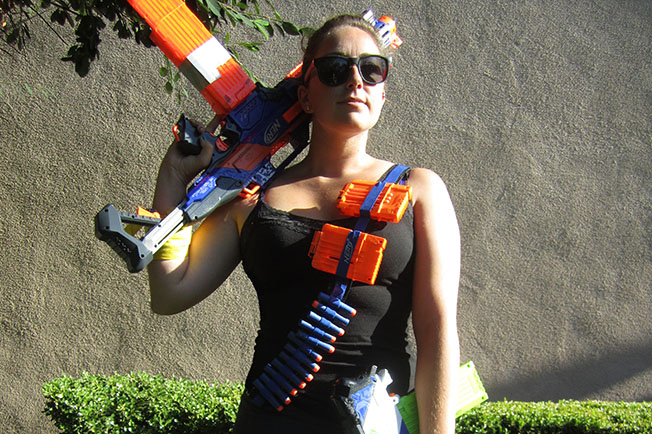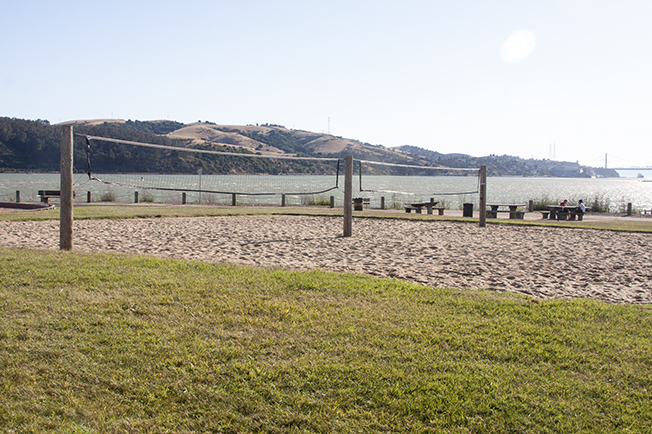“Hey, you wanna go kill some zombies?”
Excuse me, what?
This über nerdy and physically intense activity is called a NERF war, and I have only recently stumbled across its thriving subculture in my neighborhood. In Humans vs. Zombies you split into two teams: a team of Humans and a team of Zombies. The zombies’ mission is to tag the humans and turn them into zombies; the humans’ only chance at “survival” is to mow down as many zombies as possible with NERF darts and get to a safe zone.
I’m a “newb” at NERF, but my fiancé and I have a growing arsenal of NERF automatics, rifles, pistols, and melee weapons that is slowing taking over our limited closet space. It’s a never-ending stream of Facebook event invites and strangers geeking out online over NERF’s latest gun releases (“I just got the RapidStrike! You can borrow it next round”).
Don’t Go Alone: Equipment
NERF veterans are very welcoming to newbs, and are also typically very trusting with their equipment. My roommate goes to more NERF events than my fiancé and I do, but he doesn’t own a single gun. Vets love to share their guns and strategy, huddling up into bands-o’-brothers of mixed experience to fight back the zombie horde.
My first Humans vs. Zombies (HvZ) game was at San Francisco State University with a high school friend who loaded me up with a rifle to carry and as many baby pistols as I could fit in my (super-trendy) cargo pants. After loading up with darts (specially marked to distinguish from everyone else’s), all I needed was a bandolier of backup dart cartridges and a bandana around my arm (to distinguish me as Human)—I was good to go!
In that first game, there were a couple things I learned. First of all, no matter how uniquely you mark your darts, you will not get them all back. Just resign yourself to that fact from the get-go. Though your opponents are often incentivized to pick them up (either to take them out of the game or to reuse them against you), some will get lost in the arena and some will be picked up but never returned to you. Organized games usually have a dart box where you can at least take home a portion of the darts you contributed.
Another lesson for a newb is to moderate the amount of gear you carry. Running from zombies gets tricky if you’re holding onto three pistols to keep them from falling out your pockets and a bandolier of ammo is weighing you down. Now, I pretty much only carry my rifle (on a shoestring around my neck in case I need to free my hands fast), with one small pistol. I’m no good at melée, so I don’t bother touting around a foam sword as my fiancé prefers. I’m also not the best shot, so I’m fairly conservative with my darts. This means that I don’t even have to carry more than one backup cartridge, because I can refill between rounds before I run out of ammo.
Last lesson learned: don’t be afraid to ask questions! Especially back at your start point before the game or between rounds, veterans have a bunch of advice to share. One lady showed me how to duct tape two 18-dart cartridges together for quick reload. A zombie guy helped me retie my bandana so it wouldn’t keep falling down when running. Everyone’s there to have a great time and shoot each other with little foam darts: they’ll help you out!
Veteran players usually also have the most visually impressive guns. Modifying is huge in the NERF community, and it’s not uncommon to find a vet wielding a behemoth double semi-automatic with a shotgun zip-tied underneath! The versatility of NERF’s stocks and barrels allow for some easy basic modifications, and it’s also quite simple to throw in some overvolted batteries or custom-tension springs to get your NERF darts flying faster and farther. Some of the more artsy types will even paint and weather their guns for a kickass realistic look.
Competition: Capture the Flag
Not all NERF events are all-day HvZ games. There are tons of different, classic competition games, just like in paintball and airsoft. Most are competitive team games: VIP (protecting the president), King of the Hill (protecting a defensive zone), or Capture the Flag (invading the opponents’ base); however, there’s always Deathmatch (individual elimination games) to spice things up a bit and destroy all friendships, Hunger Games style.
The closest NERF organization (B.U.R.N.) to me plays a lot of Capture the Flag tournaments, with rounds of teams competing. As a newb, I really enjoy these for practice: team games normally include a spawn point, so getting shot just means that I have to run back to a spawn point and count to ten, rather than in HvZ where “dying” involves hanging up my rifle for the rest of the game and playing as a zombie.
Survival of the Fittest: Humans vs. Zombies
HvZ games typically start out with a group of dedicated zombies, decked out in fake blood, decomposing makeup and running shoes. Zombies don’t carry guns, but must instead be able to use their numbers to overwhelm and two-hand touch to infect humans. The humans are released first into the arena to spread out, camp up, and get started on their mission. Missions are typically survival-related, such as finding and moving “food” (a wrapped bundle or cardboard box) from the arena into a human safe zone. Sometimes, the missions are as unstructured as “create and defend a base.”
My first HvZ game had a twist: there were 20 antidotes and 10 passports. Not only did humans have to find the little index cards taped around campus, but they also had to compete for them! Humans without antidotes at the end of round one would die and become zombies, and those without passports at the end of round two would not make it off the infected island. This was a pretty harsh start for a newb like me when my little merry band was mowed down with darts in round one by a group of fellow humans, as we ran past their safe zone in an escape attempt from the zombie horde. Pretty sucky!
Yet, being a zombie isn’t half bad! Yeah, you have to put your gun away, but then the pressure of surviving isn’t constantly freaking you out, and the arena basically becomes a giant playground game of tag. If you’re shot as a zombie, your game rules will either require you to walk out of sight (behind a corner or tree) or just crouch down where you are and then count to the predetermined wait time. Then you’re quickly back in the game, hunting down those delicious, delicious brains.
NERF games are constantly being moderated by very dedicated groups! The organizers are usually college kids, and they appreciate and respond to feedback from NERF enthusiasts. The mods do a great job of participating and keeping everyone honest during the game. They also keep the community up-to-date with events and news, typically via Facebook or their own websites.

